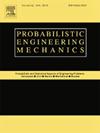Reliability analysis of cutting tools using transformed inverse Gaussian process-based wear modelling considering parameter dependence
IF 3.5
3区 工程技术
Q2 ENGINEERING, MECHANICAL
引用次数: 0
Abstract
Reliability analysis is crucial for ensuring the performability of the desired function. The cutting tool performs the machining operation at varied conditions to manufacture diverse products. During operation, the tool degrades stochastically in the form of wear. To avoid the unfavourable consequences occurring from severe tool wear, appropriate formulation of the tool reliability, considering threshold degradation level as the failure criterion, is crucial. However, the degradation of the tool during machining is impacted by the current state of the tool wear and operating conditions. Considering these, the present study proposes a state-dependent transformed inverse Gaussian (TIG) process incorporating the effects of operating conditions to develop the tool wear model. In order to evaluate the proposed method, tool wear experiments are conducted at different operating conditions following the Taguchi orthogonal array experimental design. The experimental data are utilised to estimate the parameters of the developed model using the Bayesian approach. Following the parameter estimation, tool reliability is evaluated under varying operating conditions. The comparison of the estimated median time to failure of the tools with the failure time observed in the validation experiments ensures the effectiveness of the proposed model. The proposed approach has the potential to estimate the reliability of the industrial products subjected to state-dependent degradation under varied operating conditions.
考虑到参数依赖性,使用基于反高斯过程的磨损模型进行切削工具可靠性分析
可靠性分析对于确保所需功能的可执行性至关重要。切削工具在不同条件下执行加工操作,以制造不同的产品。在操作过程中,刀具会以磨损的形式随机退化。为避免刀具严重磨损造成的不利后果,必须适当制定刀具可靠性标准,并将阈值退化水平作为失效标准。然而,刀具在加工过程中的退化会受到刀具磨损现状和工作条件的影响。考虑到这些因素,本研究提出了一种与状态相关的变换反高斯(TIG)过程,并将工作条件的影响纳入其中,以建立刀具磨损模型。为了评估所提出的方法,按照田口正交阵列实验设计,在不同的操作条件下进行了刀具磨损实验。实验数据被用来使用贝叶斯方法估计所开发模型的参数。在参数估计之后,对不同操作条件下的工具可靠性进行评估。将估算的工具失效中位时间与验证实验中观察到的失效时间进行比较,确保了所提模型的有效性。所提出的方法可用于估算工业产品在不同运行条件下随状态退化的可靠性。
本文章由计算机程序翻译,如有差异,请以英文原文为准。
求助全文
约1分钟内获得全文
求助全文
来源期刊

Probabilistic Engineering Mechanics
工程技术-工程:机械
CiteScore
3.80
自引率
15.40%
发文量
98
审稿时长
13.5 months
期刊介绍:
This journal provides a forum for scholarly work dealing primarily with probabilistic and statistical approaches to contemporary solid/structural and fluid mechanics problems encountered in diverse technical disciplines such as aerospace, civil, marine, mechanical, and nuclear engineering. The journal aims to maintain a healthy balance between general solution techniques and problem-specific results, encouraging a fruitful exchange of ideas among disparate engineering specialities.
 求助内容:
求助内容: 应助结果提醒方式:
应助结果提醒方式:


